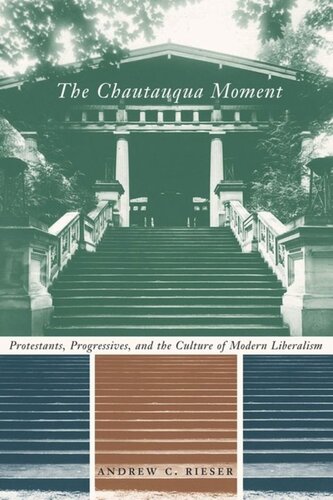

Most ebook files are in PDF format, so you can easily read them using various software such as Foxit Reader or directly on the Google Chrome browser.
Some ebook files are released by publishers in other formats such as .awz, .mobi, .epub, .fb2, etc. You may need to install specific software to read these formats on mobile/PC, such as Calibre.
Please read the tutorial at this link: https://ebookbell.com/faq
We offer FREE conversion to the popular formats you request; however, this may take some time. Therefore, right after payment, please email us, and we will try to provide the service as quickly as possible.
For some exceptional file formats or broken links (if any), please refrain from opening any disputes. Instead, email us first, and we will try to assist within a maximum of 6 hours.
EbookBell Team

5.0
40 reviewsMore than a college or a summer resort or a religious assembly, the Chautauqua movement was a composite of all of these, and for five decades after it began in 1874, Chautauqua dominated adult education and reached millions with its summer assemblies, reading clubs, and traveling circuits. This critical study weaves the threads of Chautauqua into a single story and places it at the vital center of fin de siècle cultural and political history.
This book traces the rise and decline of what Theodore Roosevelt once called the "most American thing in America." The Chautauqua movement began in 1874 on the shores of Chautauqua Lake in western New York. More than a college or a summer resort or a religious assembly, it was a composite of all of these—completely derivative yet brilliantly innovative. For five decades, Chautauqua dominated adult education and reached millions with its summer assemblies, reading clubs, and traveling circuits.
Scholars have long struggled to make sense of Chautauqua's pervasive yet disorganized presence in American life. In this critical study, Andrew Rieser weaves the threads of Chautauqua into a single story and places it at the vital center of fin de siècle cultural and political history. Famous for its commitment to democracy, women's rights, and social justice, Chautauqua was nonetheless blind to issues of class and race. How could something that trumpeted democracy be so undemocratic in practice? The answer, Rieser argues, lies in the historical experience of the white, Protestant middle classes, who struggled to reconcile their parochial interests with radically new ideas about social progress and the state. The Chautauqua Moment brings color to a colorless demographic and spins a fascinating tale of modern liberalism's ambivalent but enduring cultural legacy.